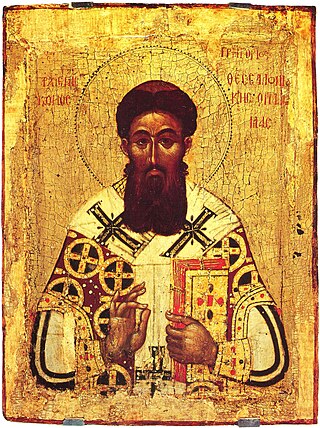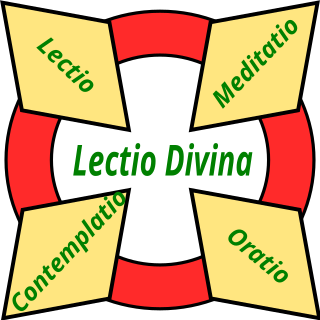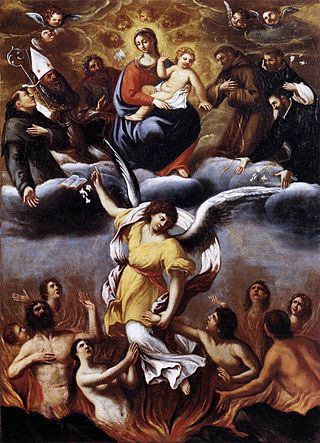Related Research Articles

Hesychasm is a contemplative monastic tradition in the Eastern Christian traditions of the Eastern Catholic Churches and Eastern Orthodox Church in which stillness (hēsychia) is sought through uninterrupted Jesus prayer. While rooted in early Christian monasticism, it took its definitive form in the 14th century at Mount Athos.

Teresa of Ávila, OCD, also called Saint Teresa of Jesus, was a Carmelite nun and prominent Spanish mystic and religious reformer.

St. John of the Cross was a Spanish Catholic priest, mystic, and Carmelite friar of converso origin. He is a major figure of the Counter-Reformation in Spain, and he is one of the thirty-seven Doctors of the Church.

Christian mysticism is the tradition of mystical practices and mystical theology within Christianity which "concerns the preparation [of the person] for, the consciousness of, and the effect of [...] a direct and transformative presence of God" or divine love. Until the sixth century the practice of what is now called mysticism was referred to by the term contemplatio, c.q. theoria, from contemplatio, "looking at", "gazing at", "being aware of" God or the divine. Christianity took up the use of both the Greek (theoria) and Latin terminology to describe various forms of prayer and the process of coming to know God.

The communion of saints, when referred to persons, is the spiritual union of the members of the Christian Church, living and the dead, but excluding the damned. They are all part of a single "mystical body", with Christ as the head, in which each member contributes to the good of all and shares in the welfare of all.
Ascetical theology is the organized study or presentation of spiritual teachings found in Christian Scripture and the Church Fathers that help the faithful to more perfectly follow Christ and attain to Christian perfection. Christian asceticism is commonly thought to imply self-denial for a spiritual purpose. The term ascetical theology is used primarily in Roman Catholic theology; Eastern Orthodox theology carries its own distinct terms and definitions, and other religious traditions conceive of following and conforming to God and Christ differently from either Orthodoxy or Catholicism.
In Christian theology, the beatific vision is the ultimate direct self-communication of God to the individual person. A person possessing the beatific vision reaches, as a member of redeemed humanity in the communion of saints, perfect salvation in its entirety, i.e., heaven. The notion of vision stresses the intellectual component of salvation, though it encompasses the whole of human experience of joy, happiness coming from seeing God finally face to face and not imperfectly through faith..
The Dark Night of the Soul is a phase of passive purification of the spirit in the mystical development, as described by the 16th-century Spanish mystic and poet St. John of the Cross in his treatise Dark Night, a commentary on his poem with the same name. It follows after the second phase, the illumination in which God's presence is felt, but this presence is not yet stable. The author himself did not give any title to his poem, which together with this commentary and the Ascent of Mount Carmel forms a treatise on the active and passive purification of the senses and the spirit, leading to mystical union.

Christian meditation is a form of prayer in which a structured attempt is made to become aware of and reflect upon the revelations of God. The word meditation comes from the Latin word meditārī, which has a range of meanings including to reflect on, to study, and to practice. Christian meditation is the process of deliberately focusing on specific thoughts and reflecting on their meaning in the context of the love of God.

In Western Christianity, Lectio Divina is a traditional monastic practice of scriptural reading, meditation and prayer intended to promote communion with God and to increase the knowledge of God's word. In the view of one commentator, it does not treat Scripture as texts to be studied, but as the living word.

Particular judgment, according to Christian eschatology, is the divine judgment that a departed (dead) person undergoes immediately after death, in contradistinction to the general judgment of all people at the end of the world.
Catholic spirituality includes the various ways in which Catholics live out their Baptismal promise through prayer and action. The primary prayer of all Catholics is the Eucharistic liturgy in which they celebrate and share their faith together, in accord with Jesus' instruction: "Do this in memory of me." The Catholic bishops at the Second Vatican Council decreed that "devotions should be so drawn up that they harmonize with the liturgical seasons, accord with the sacred liturgy, are in some fashion derived from it, and lead the people to it, since, in fact, the liturgy by its very nature far surpasses any of them." In accord with this, many additional forms of prayer have developed over the centuries as means of animating one's personal Christian life, at times in gatherings with others. Each of the religious orders and congregations of the Catholic church, as well as lay groupings, has specifics to its own spirituality – its way of approaching God in prayer to foster its way of living out the Gospel.
Mystical theology is the branch of theology in the Christian tradition that deals with divine encounter and the self-communication of God with the faithful; such as to explain mystical practices and states, as induced by contemplative practices such as contemplative prayer, called theoria from the Greek for contemplation.

In some forms of Christianity, the intermediate state or interim state is a person's existence between death and the universal resurrection. In addition, there are beliefs in a particular judgment right after death and a general judgment or last judgment after the resurrection. It bears resemblance to the Barzakh in Islam.

Mental prayer is a form of meditational prayer, "performed without aid of any particular formula." It is distinguished from vocal prayers, "prayers performed by means of a given formula." The aim of mental prayer is 'to inflame souls with the love of God' and 'live without sin'. In mystical practice, it is to be followed-up by contemplative prayer.

Prayer in the Catholic Church is "the raising of one's mind and heart to God or the requesting of good things from God." It is an act of the moral virtue of religion, which Catholic theologians identify as a part of the cardinal virtue of justice.
Catholic theology is the understanding of Catholic doctrine or teachings, and results from the studies of theologians. It is based on canonical scripture, and sacred tradition, as interpreted authoritatively by the magisterium of the Catholic Church. This article serves as an introduction to various topics in Catholic theology, with links to where fuller coverage is found.
The Roman Catholic Church has often held mortification of the flesh, as a worthy spiritual discipline. The practice is rooted in the Bible: in the asceticism of the Old and New Testament saints, and in its theology, such as the remark by Saint Paul, in his Epistle to the Romans, where he states: "If you live a life of nature, you are marked out for death; if you mortify the ways of nature through the power of the Spirit, you will have life.". It is intimately connected with Christ's complete sacrifice of himself on the Cross: "those who belong to Christ have crucified nature, with all its passions, all its impulses". Christ himself enjoined his disciples to mortify themselves when he said: "If any man would come after me, let him deny himself and take up his cross and follow me". According to the Catechism of the Catholic Church, "[t]he way of perfection passes by way of the Cross. There is no holiness without renunciation and spiritual battle. Spiritual progress entails the ascesis and mortification that gradually lead to living in the peace and joy of the Beatitudes: ‘He who climbs never stops going from beginning to beginning, through beginnings that have no end. He never stops desiring what he already knows.’". The purpose of mortification is to train "the soul to virtuous and holy living". It achieves this through conforming one's passions to reason and faith. According to the Catholic Encyclopedia, internal mortification, such as the struggle against pride and self-love, is essential, but external mortification, such as fasting can also be good if they conform with a spirit of internal mortification.

The Three Ages of the Interior Life: Prelude of Eternal Life is the magnum opus of Fr. Réginald Garrigou-Lagrange, a French theologian of the Order of Preachers. The two-volume publication represents both the summary of teaching ascetical and mystical theology for twenty years at the Angelicum and the synthesis of two other works: Christian Perfection and Contemplation and L’amour de Dieu et la croix de Jesus. The work is framed according to three stages that mark the common path of Christian perfection, which are described in conformity to the preexisting theology and wisdom of Catholic saints and Church Fathers. His synthesis has become one of the most dominant present-day interpretations of this patrimony.

Purgatory is a passing intermediate state after physical death for purifying or purging a soul. A common analogy is dross being removed from metal in a furnace.
References
- 1 2 3
 Augustin Poulain (1913). "Mystical Theology". In Herbermann, Charles (ed.). Catholic Encyclopedia . New York: Robert Appleton Company.
Augustin Poulain (1913). "Mystical Theology". In Herbermann, Charles (ed.). Catholic Encyclopedia . New York: Robert Appleton Company. - ↑ Catechism of the Catholic Church, paragraph 2731
- ↑ Reginald Garrigou-Lagrange, OP. "The Three Ages of the Interior Life: Ch 4 : The Passive Purification of the Senses and the Entrance into the Illuminative Way". Catholic Spiritual Teaching. Retrieved 2014-07-22.
- ↑ Scott, D., Mother Teresa's Long Dark Night, Catholic Education Resource Centre, 2013, accessed 18 August 2018